A Three(-ish) Year Retrospective
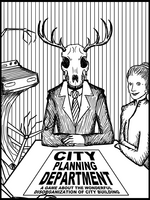
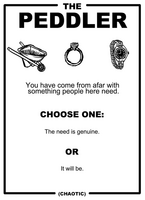
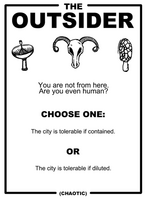
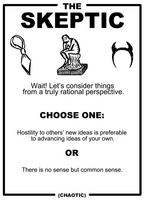
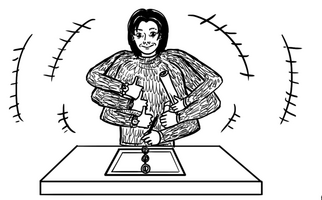
Quite a few people have downloaded City Planning Department over the past few days, so I thought I'd write a quick little retrospective on the design process!
CPD was the first TTRPG I made (in 2018, in collaboration with Andrew Tran, Alex Dawson, Willy Wu, Paul Geldart and Raul Altosaar). It's a oneshot secret-role citybuilder - think mafia meets The Quiet Year.
We started with a mood goal: we wanted players to take joy in disorganization, disagreement and chaos. The wacky politics of small-scale urban planning seemed a great place to start. We didn't want players to care too much about the people in their city - otherwise they would stray from the mood. But the problem with disorganization is that it can quickly become edgy, random and uninteresting.
Thus the design challenge: how to balance between chaos and care?
Our solution: secret roles with specific goals for the city. Some characters desire order; others advocate for specific goals; some are chaotic or argumentative. Every role has two interpretive options; players get a lot of latitude for how to imagine their characters within the specific context of the city.
Regardless, players can't discuss their goals - only debate the construction of buildings. Players take turns debating and altering building proposals; they often end up with absurd provisions, and the simplest ideas can cause the most heated arguments. Slowly the city becomes a manifestation of petty disagreements and personal grudges. Then at the halfway mark, just when the dynamic starts to settle, players receive shift cards that change their motivations. Shift cards also ask players to reflect on their motivations and emotions. With this new reflective atmosphere, and with the resulting changes in playstyle, the chaos of the game takes a different shape; it becomes a little heavier, more intense.
There is no incentive to discover each other's secret roles – there is so much room for interpretation and specificity, and cards are general enough that even if you knew, you wouldn’t be able to predict others’ reactions to your ideas anyways. As a result, players come to the table knowing they will never learn each other's underlying motivations. Instead, they make temporary alliances and bad compromises.
Compared to other worldbuilding games and TTRPGs, CPD feels so different. It is competitive, sometimes fiercely. Players need to be on the same emotional wavelength or it can create real tension. By game's end, the story of the city feels final; usually players are happy to leave it behind, even though they enjoyed watching it grow and unravel. All in all, though, I'm really happy with the way CPD balances between chaos and care. Players have enough distance to enjoy the absurdity of their city's story, but invested enough to believe in their vision for the place. They invent ideas for their secret roles but don't obsess over them.
Looking back, what I enjoy most about CPD is the tone. The eerie eldritch employee-manual writing hits just right - players feel like a cross between low-level bureaucrats and gods. Familiar archetypes (the capitalist, the tech innovator, the activist) become uncanny & alien, making players reflect on their role in our world. Having played more TTRPGs, I'd definitely make some changes if I were to re-release the game - clearer safety tools, a more scripted/structured proposal/debate system, more player agency for vetoing and denying proposals. But it makes me think about my more recent games differently too. CPD feels so fresh because we drew from other types of social games and worked with a specific mood in mind from the beginning. What other interesting TTRPGs could I make, following this blueprint?
It you've downloaded or bought CPD, thank you so much - I'd love to hear what you thought of it!
Files
Get City Planning Department
City Planning Department
a oneshot tabletop game about monstrous city planning
| Status | Released |
| Category | Physical game |
| Author | Kaelan DM |
| Tags | City Builder, Co-op, Funny, Horror, Local Co-Op, Local multiplayer, Monsters, Tabletop |
Leave a comment
Log in with itch.io to leave a comment.